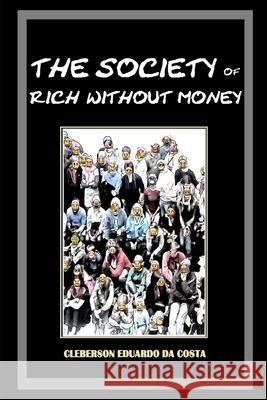The Society of Rich Without Money: Capitalist ideology, hegemony and The myth of school success » książka
The Society of Rich Without Money: Capitalist ideology, hegemony and The myth of school success
ISBN-13: 9781497455283 / Angielski / Miękka / 2014 / 138 str.
The Society of Rich Without Money: Capitalist ideology, hegemony and The myth of school success
ISBN-13: 9781497455283 / Angielski / Miękka / 2014 / 138 str.
(netto: 49,92 VAT: 5%)
Najniższa cena z 30 dni: 52,13 zł
ok. 16-18 dni roboczych
Bez gwarancji dostawy przed świętami
Darmowa dostawa!
They were, and still today - at the dawn of the 21st century - many are those who, driven by political-economic ideas of Marxist thought, advocated and recommend the "end of capitalism." Or is advocated, and recommend that, following a dynamic process material and/or naturally dialectic of history, the political society would be capitalist and/or will also, of course, incorporated by civil society, giving rise to a society dictates perfect, without classes, in which all men excluded, in it, finally would be free of injustices and/or social inequalities. What is evident, however, is that, historically, capitalism, in spite of going through many crises and by also being a political system whose economic your class and /or social group has, by nature, as a principle, disaggregate more members of that exactly aggregate, he always maintained its hegemony. That is, he (capitalism), contrary to the Marxist theses on your supposed order, on the other hand, according to the already first analyzes political-economic of Italian Antonio Gramsci, from the 20th century, also brought with him the call "Hegemony," making it with that - through the ideological character of it - if went down they could switch over and not only did not affect his "natural dialectic of history." Or is, in other words, becoming with which he, capitalism itself, while political society, by means of the ideology, remained as dominant class and were not incorporated by "civil society," in the sense visionary of Marx, according to which, as already mentioned, but who here also worth reiterating, even if it would dissolve, giving rise to the so-called "perfect society and/or without classes." In this sense, the objective of our work is to carry out a study on the problems regarding the ideological relations between the call, here, "Society of the rich without money" and capitalism, in so far as the latter, while political society has, in western societies post-modern capitalist, systemized and diffused in horror of socio-cultural proletariats, (in the form of values and principles for these internalized) the ideals and capitalist ideas, "cooptando" (internalizeding in them the capitalist values), without, however, in that same ideological process, on providing great social and/or redistribute material means also of social production of existence. This, for us, it is evident as being one of the most radical and, at the same time subtle, forms of capitalist hegemony present in the 21st century. For this track - as we will see further in the course of our work - there are two essential aspects, while epistemological assumptions that define and/or qualify the members belonging to this so-called "Society of the rich without money," present in western capitalist societies post-modern, namely: 1-The fact of the individuals belonging to it, to this "society of the rich without money," they are always, through the use alienated and/or addict of bank credits, "increasing almost always the power of consumption without, however, in those cases, also increase their rents," making it well (while a significant group of individuals belonging to call active population) "wage slaves of capital," i.e., being placed, by the ideology of the capital, in the quality of disgust and dehumanized slaves-proletarians, selling their labor forces only for pay, the first track: a-High rates of taxes to governments capitalist and, in the second: b-High interest rates the economic elites (banks, financial institutions, etc. ). 2-The fact of the same, while excluded from social, seeing still at that school success and/or access to the upper level and/or one of the greatest possibilities (ideologically preached by capitalists) to reach the "upward social mobility," i.e. to achieve the social ascent via the high degree of study and/or the access to undergraduate and post-graduate, in so far as, in the same way, it has been - for centuries by signal - established also in those same...
Zawartość książki może nie spełniać oczekiwań – reklamacje nie obejmują treści, która mogła nie być redakcyjnie ani merytorycznie opracowana.











